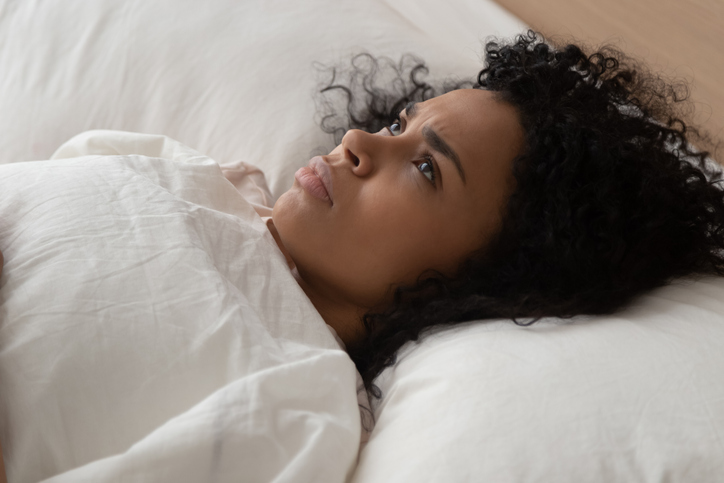COVID-19 Anxiety Keeping You Awake? Be Proactive

I cannot imagine what it’s like to be a frontline COVID-19 healthcare worker. They put their own health at risk, witness people die without their families, make incredibly tough decisions that could save one person but mean death for another and so much more.
Day after day, these workers experience these stresses. And to make matters worse, many are extremely sleep deprived due to long, grueling shifts and, of course, high anxiety levels that may prevent a good night’s rest.
“The doctors and nurses are sleep deprived. Overcaffeinated. Overstressed,” according to one recent article discussing the environment at hospitals in New Jersey as we fight this pandemic.
Of course, healthcare workers in New York city and all over the United States have shared the same sentiment.
Furthermore, one study found that more than one third of healthcare workers suffered from insomnia during the COVID-19 epidemic in China.
And even those of us who are not healthcare workers and have the privilege of safely working from home, may currently be suffering from sleep issues. I know there are some nights when I have had to reach for that extra dose of magnesium to fall albecause of "coronavirus anxiety."

There are also recent articles about “coronavirus dreams and nightmares.”
According to this Time Magazine article, “A recent ‘dream survey’ conducted by Deirdre Leigh Barrett, an assistant professor of psychology at Harvard Medical School, seems to confirm that the incidence of vivid dreams has increased as the virus has spread around the world. This would not be unprecedented: studies have shown that events like 9/11 changed the way people dreamed for a time, making their dreams more intense and memorable in the days after the attacks.”
Furthermore, the writer of the article states: “One thing we can say for certain is that the current coronavirus crisis has led to a great deal of stress and anxiety for many millions of people. Research has shown that increased anxiety during the day can lead to more negative content in dreams, something several people I spoke to about their COVID-19-related dreams reported.”
Despite the challenges we may face with getting a good night’s rest (we should aim to get at least seven hours a night), we have to be proactive and do everything we can to get sufficient, quality sleep.
In my opinion, sleep (quality rest) is one of the 6 “doctors” we all need to maintain our overall health and wellness.
There is a large body of evidence which suggests that sleep deprivation and a lack of quality sleep may contribute to a slew of health issues, including impaired immune function. And we need to be as healthy as possible in order to win the battle against COVID-19.
“A recent article published in the Academy of Nutrition and Dietetics, states getting enough sleep can actually help you maintain a healthier lifestyle. With the COVID-19 pandemic affecting our quality of life, remaining healthy should be a priority,” according to this recent Medical Xpress report.
Examples of health problems associated with sleep deprivation.- Diabetes (Type 2)
“Insulin helps regulate glucose control and lack of sleep can reduce insulin production. Having a healthy balance between insulin and glucose is key to avoiding Type 2 Diabetes,” reports Medical Xpress.
Diabetes is also a major cause of heart disease and stroke. Many Americans are diabetic or prediabetic and don’t even know it.
- Compromised Immune System
Not getting enough sleep may contribute to increased levels of stress hormones such as cortisol. The reason why cortisol is usually called “the stress hormone” is because it is the main hormone involved in the body’s fight-or-flight response.
Cortisol also helps maintain blood pressure, regulate blood sugar, reduce inflammation and turn the food you eat into energy (National Institutes of Health). But this does not mean that you want an excess of this hormone.
With a lack of sleep and an increase in stress hormones, this may prevent you from having an adequate amount of the good hormones. This can compromise the body’s immune system.
According to Medical Xpress, “Adequate sleep improves our body's ability to attack a bad virus and allows us to jump in quicker to destroy it. Lack of sleep also increases white blood cells which in turn increases our inflammation and has the potential to slow our recovery from illness.”
- Cardiovascular Disease
Apparently, sleep can have a major impact on our cholesterol and blood pressure levels.
(There is good cholesterol and bad cholesterol. You also do not want your blood pressure to be too high or too low).
A lack of sleep has been connected to higher bad cholesterol levels and higher blood pressure. Blood pressure naturally goes down when we sleep, so insomnia and chronic sleep issues is associated with hypertension (high blood pressure).
Kids need plenty of rest too.
“Ever advancing scientific research is indicating that children who do not obtain adequate sleep have a higher incidence of developing Type 2 Diabetes. Sleep aids in reducing behavioral issues and improves mental health,” reports Medical Xpress.
How much sleep your child needs depends on his or her age. To find out how much sleep your child needs according to age, click here.
I know how it is. Someone tells you to sleep, and then you do just the opposite. Sleep is one of those things that can’t really be forced.
I do believe that maintaining your overall health by eating a nutrient-rich diet, exercising regularly, getting outside and getting sun and managing your stress levels helps with consistently getting a good night’s rest.
There are also specific foods and nutrients that may aid in sleep, which you can read about here.
It is also important to moderate your intake of caffeine especially during the later hours of the day (and perhaps avoid it if you are a slow caffeine metabolizer). Alcohol may also disrupt sleep.
For more information on how you can help yourself get sufficient, quality sleep, check out these pH Labs blogs.
You may also have to talk to your doctor or a competent healthcare professional about your sleep issues.
Enjoy your healthy life!
The pH professional health care team includes recognized experts from a variety of health care and related disciplines, including physicians, attorneys, nutritionists, nurses and certified fitness instructors. This team also includes the members of the pH Medical Advisory Board, which constantly monitors all pH programs, products and services. To learn more about the pH Medical Advisory Board, click here.







